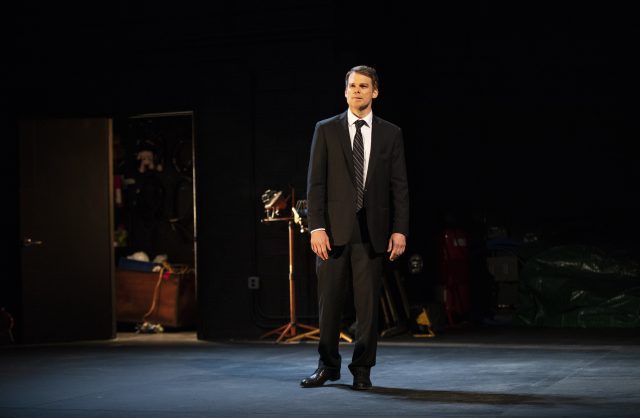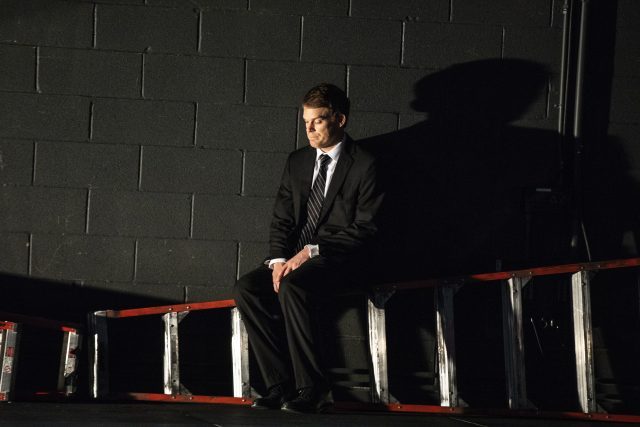
A man (Michael C. Hall) examines his life in Will Eno’s Thom Pain (based on nothing) (photo © 2018 Joan Marcus)
The Pershing Square Signature Center
The Irene Diamond Stage
480 West 42nd St. between Tenth & Eleventh Aves.
Tuesday-Sunday through December 9, $35-$65
212-244-7529
www.signaturetheatre.org
At the entrance to the Irene Diamond Stage at the Pershing Square Signature Center, a sloppily handwritten sign says, “Pardon Our Appearance.” The theater inside seems to be in the midst of some serious construction: There’s a huge hole in the floor at the front of the stage, which is littered with various pieces of equipment, and protective sheets hang on the walls and from the ceiling, as if preventing the place from collapsing. Amy Rubin’s deteriorating set matches the crumbling mind of Thom Pain, superbly played by Michael C. Hall, in the Signature revival of Will Eno’s 2004 Pulitzer Prize finalist, Thom Pain (based on nothing), which opened last night. Pain is the epitome of the unreliable narrator, beginning jokes and stories he never finishes, posing repeated questions that he answers differently each time, and inviting audience participation only to then take it back. “How wonderful to see you all,” he says at the start, in near-complete darkness save for the occasional light from his cigarette. The seventy-minute monologue, previously performed by James Urbaniak and, more recently, Rainn Wilson in LA in 2012, touches on such notions as time and memory, fear and loneliness. Wearing an everyman-style standard suit (the costume is by Anita Yavich), Pain walks back and forth across the deep stage and wanders through the audience as he indifferently relates a tale about a young boy, his dog, and a puddle, possibly a scene from his past that left him emotionally scarred. “When did your childhood end?” he asks rhetorically. “How badly did you get hurt, when you did, when you were this little, when you were this wee little hurtable thing, nothing but big eyes, a heart, a few hundred words? Isn’t it wonderful how we never recover? Injuries and wounds, ladies and gents. Slights and abuses, oh, what a paradise.”

Michael C. Hall is mesmerizing as the title character in Thom Pain (based on nothing) at the Signature (photo © 2018 Joan Marcus)
He self-referentially refers to the show as “our little turn, on the themes of fear, boyhood, nature, hate, the nature of performance and vice-versa, the heart of man, of woman, et cetera.” He steps in and out of darkness courtesy of Jen Schriever’s sharp lighting design. “Does it scare you? Being face-to-face with the modern mind? It should. There is no reason for you not to be afraid. None. Or, I don’t know,” he says. He makes direct eye contact with as many audience members as he can, searching for connections that have otherwise eluded him. “As for our story, if you’re lost at all, you’re not alone,” he tells us. “Don’t think I’m somewhere out ahead, somewhere, anywhere, with a plan. I’m right here beside you, or hiding behind you, like you, in terrible pain, trying to make sense of my life. I’m just kidding — you probably are alone. Or, I don’t know. Where are we, exactly, I wonder, in your estimation, in mine.” By the end, we know everything about him, as well as nothing, his search for relevancy perhaps evoking our own.
Hall, the Dexter and Six Feet Under star who has excelled on Broadway in Eno’s The Realistic Joneses and John Cameron Mitchell and Stephen Trask’s Hedwig and the Angry Inch and off Broadway in Ivo van Hove’s Lazarus, is outstanding as Pain, a role that Eno (Title and Deed, The Open House, Wakey, Wakey, all at the Signature) notes in the script should be played by an “actor [who] must also create a character that is close to — and largely derived from — himself.” Hall keeps us mesmerized with just the right amount of confusion to make us wonder what is real and what isn’t, what is truth and what is not. When he asks several times if we like magic, he is also referring to the magic of theater, which Eno and director Oliver Butler (The Open House, What the Constitution Means to Me) tear down rather elegantly. It’s a disorienting yet exhilarating experience, a journey into the digressive nature of life, constantly under construction, and the mind of a man trying to find his place in the world, just like we all are.